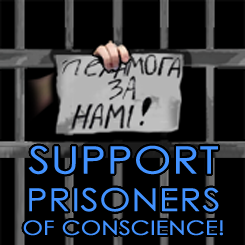Why have authorities condescended to the mild sentence for Young Front activists?
Why have the authorities agreed with the light sentence for the Young Front’s activists? What does this step mean in the corridor negotiations with the West ? Do not the authorities wish to make a sort of a step toward the opposition and the civil society ? Those and other issues are discussed in the “Expertise of Freedom “ broadcast by the political scientist Alyaksandr Klaskousky and international coordinator of the Charter’97 Andrey Sannikov at the Radio Svaboda.
“A year ago we would not have anticipated such sentence”.
Tsygankou: “It became commonplace among the policymakers and analysts to consider the ahead of schedule release of Sevyarinets and Statkevich on probation, light sentence to the Young Front activists as the Belarusian authorities’ steps in their bargaining with the West. Do you agree with such statement? If yes, than what are the conditions of the bargaining and what are both parties’ standpoints?
Sannikov: “Evidently, the bargaining is underway. A year ago we would not have anticipated such sentence. The major bargaining condition of the Belarusian party is “ the improvement of economic relations with Europe. As rather dangerous if not crisis economic situation has developed in Belarus ‘.
Klaskousky: “Minsk wants to improve its relations with the West and get certain bonuses for that.
As far as bargaining is concerned certain declarations seem schematic when it is said that “the political prisoners are exchanged for trade preferences”. The one who knows the mechanism of decision –making on preferences annulment also knows that the primary criterion here is” the situation of trade-unions and not of political prisoners”. Though, naturally, anyway different international institutions take into account the general context of the Belarusian issue.
The Belarusian party wants to make a minimum of concessions and then to lodge a full scale claim to Europe. Such tunes have been already played: ”We have given permission for opening the representation office of the European Union but they haven’t made any counter -steps ”.
Even if all political prisoners are released it is not democratization , yet
Tsygankou: “After saying ”A” you are to say “B” and release the other political prisoners. And, primarily, the key figure for Lukashenka –Alyaksandr Kazulin. Is Kazulin to be released and is the West to start negotiation with the Belarusian authorities if Kazulin remains behind the bars?”
Sannikov: “Improvement of conditions or release of the politically repressed is the major trump card in the Belarusian regime’s bargaining with the West. I think the authorities will do their best to keep Kazulin in prison.
I suppose, here everything depends on the principle standpoint of the West. To the best of my knowledge, there is a set of requirement with Brussels. If they strongly insist on termination of repressions and only than” move forward” than the Belarusian party will meet this requirement.
Klaskousky: “I think the Kazulin’s issue is the main headache of the Belarusian authorities. Because Kazulin is the toughest and the most bold opponent of the power. That is why, I suppose, firstly, they will try to make a long story of it and ,secondly, will make a semi-dicision: amnesty or decreasing of the term in prison , etc.
As far as the West is concerned the negotiations have been already underway.
In the corridors, but certain symptoms point to the fact that the dialogue is underway. And it is very important here that for the West not to overlook the principle issues concerning creation of a certain space , course for democratization.
Also even if we imagine that tomorrow all the political prisoners are released, there still won’t be any space for changing the situation in Belarus. If we hear from the President about ”free aspects” concerning voting and votes calculating that even the most charismatic candidate of the opposition won’t be able to change anything. That is why the issues of electoral legislation democratization, mass media release” worry the official Minsk most of all and they won’t give up for all they can”.
Tsygankou: “Opposition and the unity of experts often apriori reject any steps of the present authorities, do not trust them. And may be Lukashenka is eager to say something not only to the West but also to the civil society. May be he wants to send a message” Look! We have changed. Let us jointly oppose the Russia pressure”.
Sannikov: “Such steps should be noticed. There are different groupings surrounding Lukashenka. It has recently become mostly prominent .We should also suggest the steps for democratizations, maybe not to the highest authorities but to the medium rank.
I agree that we should care for independence, economic development of the country, energy independence. That is the most solid basis for moving forward and making the dialogue inside the country.
I can’t say that a full- value dialogue is underway. The West is probing the parties’ standpoints. And there is no transparency in the steps discussed by the West.
Klaskousky: “There is no sense of falling into the euphoria and naively hope that tomorrow the Belarusian regime is to become” soft and fluffy” .It is toughly pressed by the conditions and nothing different should be anticipated.
From time to time we hear messages to the opposition that they do not support the authorities in protection of the independence. And how? The most natural thing will be to allow political actions , let them protect in the parliament , let the writers speak. Freedom should be given to those things which are suppressed now.
If these process started than we might have spoken about the regime’s evolution. But it has not been noticed until now. Anyway the principle position of the European union on those 12 conditions will lead to the situation when the authorities will have to introduce amendment to the electoral legislation and to the situation with the mass media. Thus shaping the political space for democratization.
